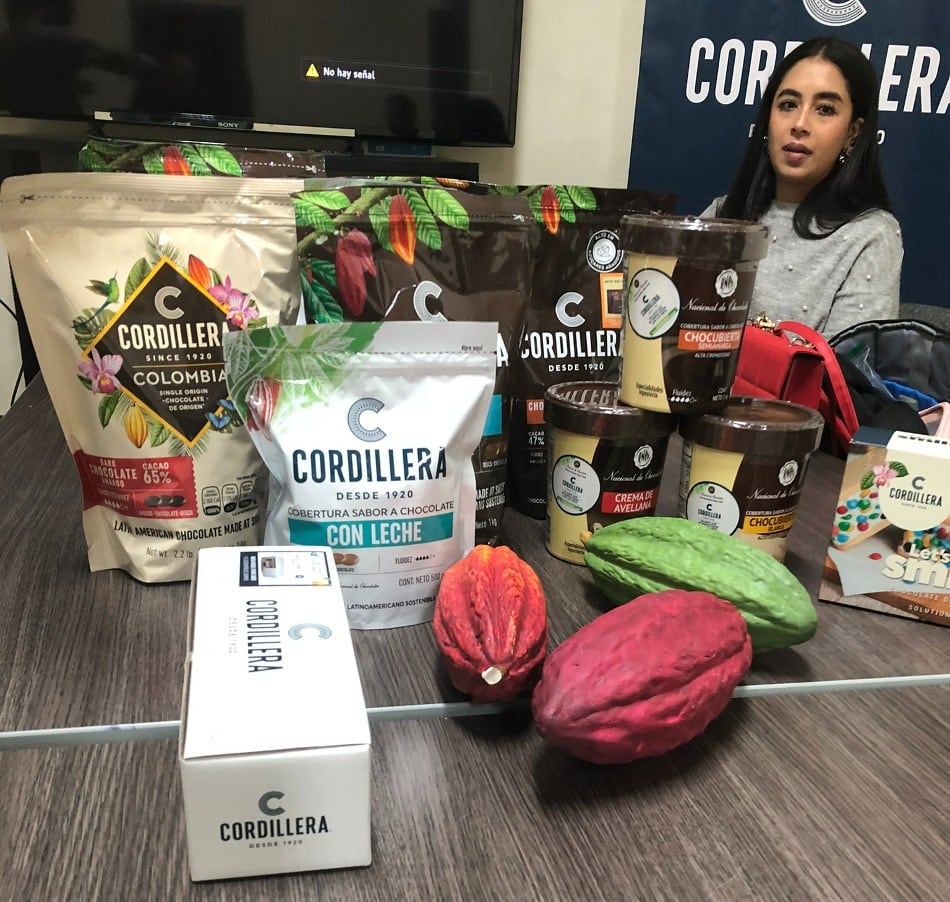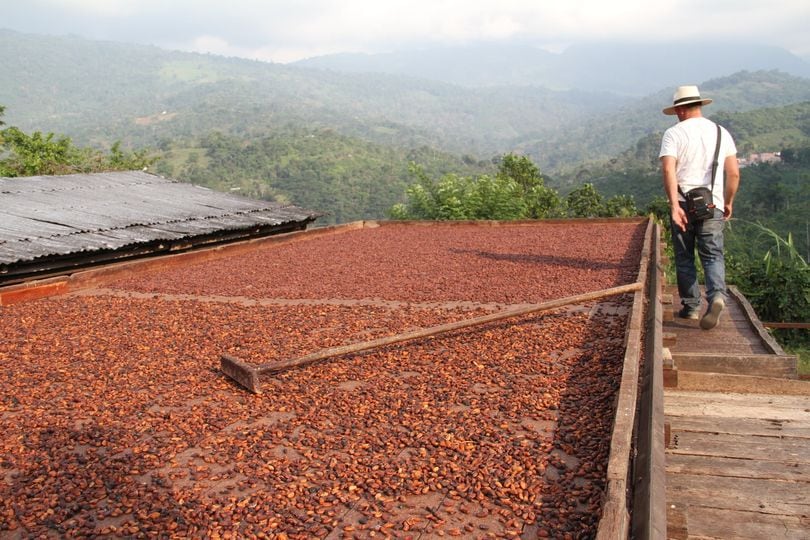Under the umbrella of the Nutresa Group, Compañía Nacional de Chocolates’s purchased just over 35,000 tons of single-origin Colombian cocoa in 2021, more than half of the country’s total output of 65,174 tonnes.
The main region for cocoa production in Colombia is Santander where 41% of the country’s production occurs. It is also where Compañía Nacional de Chocolates’s (Cordillera’s parent company) Yariguíes Experimental Farm is located.
Headed up by Juan Fernando Valenzuela, the group’s Director of Purchasing and Agricultural Development, it acts as a major research and development centre where it trains cocoa growers on multiple subjects including good agricultural practices, sustainability issues, disease control and productivity.
If we want to increase the competitiveness of the cacao sector in Colombia, we need highly productive clones like the ones we have just registered -- Alejandro Gil, Leader in Purchasing & Agricultural Promotion Department, Compañía Nacional de Chocolates
It is also the only cocoa farm in Colombia certified in Carbon Capture under the Best Agricultural Practices (BAP) scheme.
In 2021, after 15 years of research, Compañía Nacional de Chocolates became the first private company in Colombia to register two new varieties of cocoa beans that have been cloned on the farm – the CNCH 12 and CNCH 13, both with their own unique fine flavour.
The CNCH13 cocoa bean is already exciting the group’s clients as not only does it possess the premium fine flavour of Colombia’s single-origin cocoa but it is also designed to complement wine.
Along with the special taste, the two new varieties will allow more cocoa families to benefit from growing the new beans as they are self-compatible, with high production yields, which in general will help to promote a more competitive sector and a sustainable supply for Colombian cocoa.
According to a World Bank study last year, Colombian cocoa offers an important opportunity for sustainable economic development in the country but while cocoa has long been cultivated and consumed domestically, Colombia ranks only 10th in global production with just a 1% market share.
As an established Colombian chocolate manufacturer, Cordillera sources most of its cocoa from more than 65,000 families in the country, with 90% of the cocoa price going directly to its farmers where it operates across South America.
Single-origin chocolate - where the product comes from one variety of cocoa, or cacao, harvested in one region - is becoming a sought-after commodity for consumers willing to pay extra for a clean and transparent product with a small supply chain that is proven to be sustainably sourced.
Cordillera sources its cocoa from the ‘Criollo’ and Trinitarian beans, grown on its own farms in Colombia as well as Ecuador, Venezuela, Peru, The Dominician Republic and Costa Rica, countries that are also regarded as the most biodiverse in the world.
“Single Origin is a growing trend,” said Ewa Hudson, head of market insights at Lumina Intelligence, “and western consumers really appreciate the value of products promoting single origin.”
The Compañía Nacional de Chocolates’s Yariguíes Farm is at the forefront of many of the sustainable and agricultural innovations sweeping the country’s cocoa sector since political stability was secured in 2016 when the government signed a peace deal with the FARC terrorist group.
It is where ConfectioneryNews visited earlier this year. The company bought the 263-hectare farm (53 hectares are in a protected area, and over 150 hectares are used specifically for growing cocoa) in 2008. It lies in the Barrancabermeja municipality, 110 metres above sea level, with perfect conditions for growing fine, single-origin cocoa.
Cocoa bean innovations
Valenzuela says that all its innovations, including the two new CNCH 12 & 13 clones, were only made possible by developing Yariguíes as an ‘experimental farm’.
“We are open to share the knowledge that we have learned in the past 60 years with all farmers. Today we are an outward-looking company, which was not always the case,” he says on a tour of the cocoa farm.
Sharing of information on crops, productivity, agricultural practices and weather conditions is crucial, he tells me, and the company has developed an app, Mundo Cacao, to keep all its farmers up to date, on yields, harvest conditions and crop disease monitoring.
Colombian cocoa is a sustainable product - and the best way to spread the word is by education -- Natalie Quintero, Global Marketing Director, Cordillera Chocolates
Small-holder farmers can also find out about conferences and training courses on the latest sustainable practices. Compañía Nacional de Chocolates supplied almost 5 million units of high-quality planting material to farmers in 2021. That same year, it organised 340 training sessions for farmers, benefiting over 4,500 people from Colombia´s cocoa-growing community.
Natalie Quintero, Global Marketing Director, Cordillera Chocolates says the amount of cocoa material that the company gives to farmers for free is one of the largest in the world.
Growing cocoa can lift up rural farmers, bring down greenhouse gas (GHG) emissions caused by deforestation, and advance Colombia’s standing in the international chocolate market, the World Bank reported in its study.
Alejandro Gil, the company’s Leader in Purchasing & Agricultural Promotion Department, was part of the team that developed the two new clones. He says that this year on the farm they have experienced 20% more rain than the previous year.
“In Colombia we have a yearly productivity of some 400 kg per hectare, which is pretty low. This year, due to the increased rainfall, this productivity might go down. To produce two tons of dried cocoa beans per hectare you need to produce around 2 kg per tree, which means that each tree has to produce around 35 to 40 pods every year. For this reason, if we want to increase the competitiveness of the cacao sector in Colombia, we need highly productive clones like the ones we have just registered.”
The World Bank says by adopting sustainable agriculture methods and enhancing coordination mechanisms, the country’s cocoa producers will be able to increase land productivity, reduce costs, and mitigate GHG emissions - all while expanding their access to and competitiveness in international markets.
Carbon-certified
As one of the largest cocoa producers in the country, the group is keen to lead by example. Gil says that 60 acres of Yariguíes is already carbon certified and it is a member of the Dow Jones sustainability programme, where Nutresa is recognised as one of the most sustainable food companies in the world.
“Clients are asking for carbon neutral certification for our chocolate, we have complied and our chocolate is certified at origin in the cocoa farm. It is also Fairtrade certified,” says Quintero.
Valenzuela recognises that deforestation does occur in Colombia, but not on the scale of West Africa, and the Colombian government has strict laws to protect forests and is also involved in improving the skills for farmers. Its Cordillera brand has also signed an agreement with the Cocoa Forest Initiative.
“Colombian cocoa is a sustainable product,” says Quintero, "and the best way to spread the word is by education. In chocolate we started around two years ago, we had to be honest, we introduced tasting tools and sessions with our 14 chocolate chefs with an emphasis on appreciating good chocolate. We are working with the government and NGOs because they have a huge capability to spread the word about the good work we are doing in promoting single-origin Colombian cocoa.”
The potential of Colombian chocolate is huge and today, with the economic and political situation in the country stable, farms like Yariguíes are very much a part of its future.


